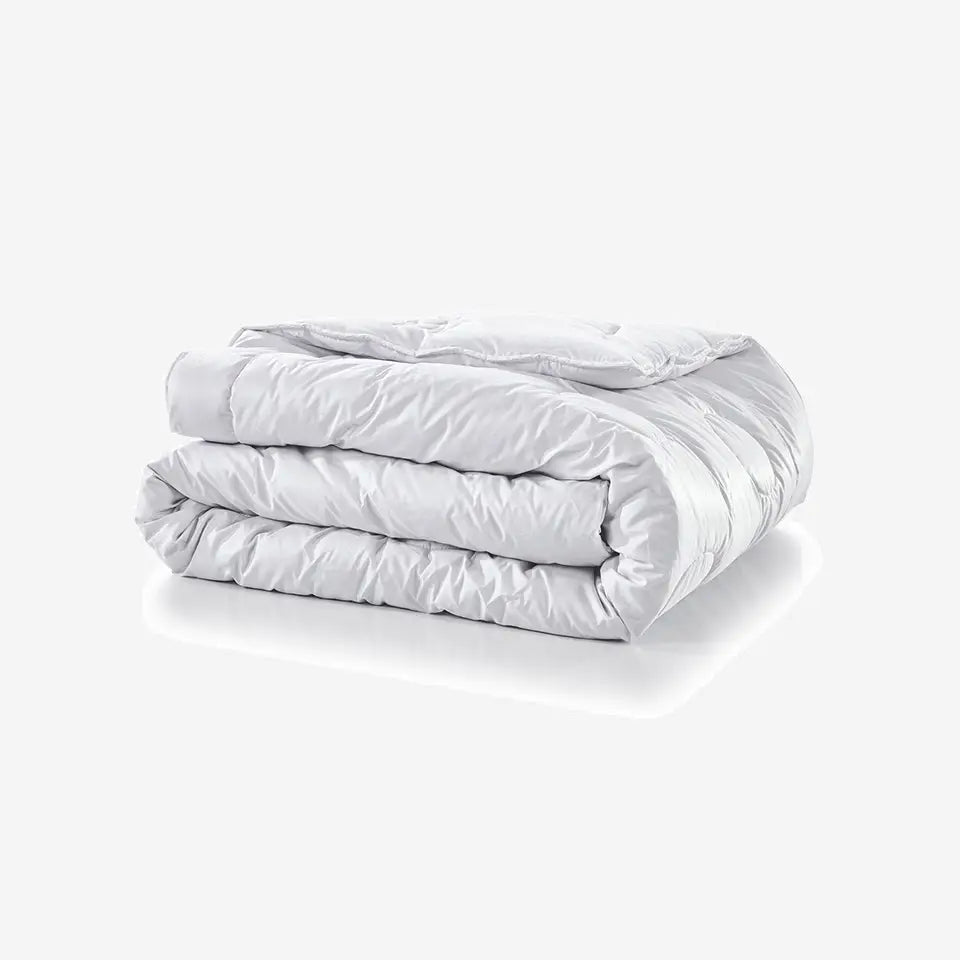
Which duvet should I choose?
There are many different duvets available, and the choice that suits you best depends on the individual. On this page, you'll find answers to your questions about duvets.
- What types of duvets are there?
- What are the pros and cons of different duvets?
- Which duvet is best against sweating?
- What is a down duvet?
- What is the best duvet?
- Which duvet is best for allergies?
What types of duvets are there?
Below is an overview of the different types of duvets.

What are the pros and cons of different duvets?
The pros and cons in an overview
|
Material |
Advantages |
Disadvantages |
|
sheep wool |
+ Ventilating |
- Often not washable itself
|
|
Camel wool |
+ Lighter than wool |
- More expensive |
|
Cashmere wool |
+ Light, feels like down |
- Duration |
|
Wild silk |
+ Very light filling |
- Not insulating |
|
Down |
+ Light |
- Variability in quality |
|
Tencel |
+ Light |
- Less well insulated |
|
Bamboo |
+ Sustainable |
- Less well insulated |
|
Cotton |
+ Well ventilated |
- Less well insulated |
|
Linen |
+ Wear-resistant |
- Less well insulated |
|
Polyester |
+ Cheaper |
- Variability in quality |
Which duvet is best against sweating?
A wild silk duvet is the ideal material for this. While wool primarily has insulating properties, wild silk is a highly breathable material. It comes from the silkworm and is very light. This is due to the long, flat fibers that offer little insulation. The duvet feels much lighter than a wool duvet. This duvet is very suitable as a summer duvet, but also for people who sweat easily or for those who experience hot flashes at night.
What is a down duvet?
A down duvet is made from goose down. The geese are plucked during the molting season. Down duvets have very high insulating properties. They feel much lighter than a wool duvet. The down content, expressed as a percentage, indicates the quality of your down duvet. The higher this percentage, the lighter and warmer the duvet will feel. Down also has strong moisture-repellent properties. This makes it less suitable for people who get too hot easily and/or sweat easily. A down duvet, on the other hand, is ideal for people who get cold easily and want the feeling of sleeping under a cloud.
Be sure to look for manufacturers whose down is collected in an animal-friendly and natural way, and where the entire duvet can be cleaned and refilled. This way, your down duvet can be slept in for a lifetime, which may mitigate the high initial price tag.
What is the best duvet?
The very best duvet is filled with cashmere wool. Although merino wool is already excellent, cashmere wool is one of the finest types. Cashmere is made from the fleece of mountain goats that live at high altitudes. These animals are subject to highly variable temperatures, which also ensures excellent insulation and ventilation.
The combination of a spring and autumn wool duvet and a wild silk summer duvet makes a perfect all-season duvet. Only wool in spring and autumn, only wild silk in the warmer summer, and a combination of the two in the colder winter. The wool-wild silk combination also allows you to maximize the insulating or ventilating properties, depending on which part you place facing you. If you place the wool facing down, you get more insulation. If you place the wild silk facing you, you get more ventilation.
What should I pay attention to when buying a new down comforter/ duvet ?
Before you buy a new duvet, consider what applies to you. We're all different, and everyone has a different sleeping environment. The best duvet for you depends on your preferences. Consider the following questions:
- Do I get hot or cold easily? Do I sweat a lot or a little?
- Do you like to sleep under a rather heavy or light blanket?
- Can I wash the duvet?
- Is my bedroom heated or not, or is the window always open?
- Is my house well insulated?
Which duvet is best for allergies?
A Tencel duvet is a good choice if you're looking for a duvet with high hygiene and anti-allergy properties. You can also wash it at 60 degrees Celsius, ideal for killing dust mites in allergy sufferers. Because Tencel is very ventilated and offers less insulation, an all-season duvet is recommended if you get cold easily.
A duvet made with synthetic fibers is another option. Most of these duvets can also be washed at high temperatures. The emphasis here is less on insulation and ventilation.
When choosing a synthetic duvet, look for one with the finest, hollow fibers possible. Hollow fibers provide better insulation than flat fibers. A fine fiber also provides better insulation. The finer the fiber, the fewer fibers you need to achieve good insulation. This also has the significant advantage of improved ventilation, as moisture can more easily pass through the duvet.


